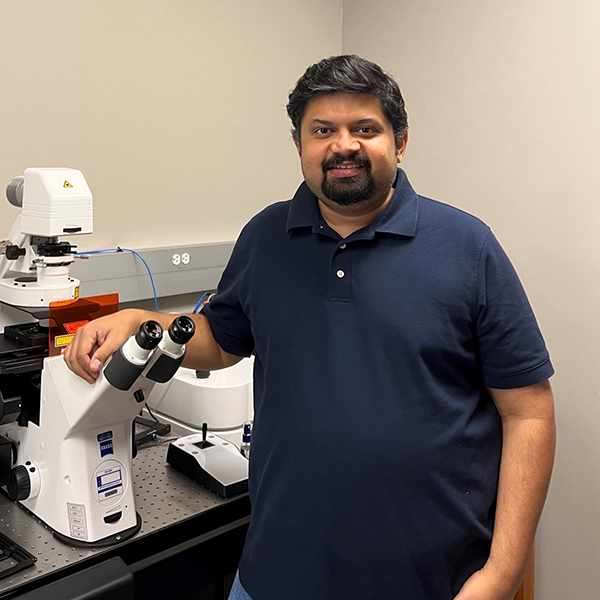Faculty Spotlight – 2022

Amit Joshi began his interest in the formation and function of organelles during his doctorate at Wayne State University that continued through his postdocs. Joshi’s doctoral research focused on understanding the role of cardiolipin, a mitochondria specific phospholipid, on the function of mitochondria.
“I got interested in this research because I was fascinated by this special phospholipid that could affect the function of the mitochondria, commonly known as the ‘powerhouse of the cell’. I was immediately attracted by these dynamic and fascinating organelles.”
Following this, he did his post-doctoral training in the Prinz lab at National Institutes of Health in Bethesda and the Cohen lab at University of North Carolina in Chapel Hill. During this time he discovered a novel family of proteins that generate localized membrane curvature responsible for formation of new organelles such as peroxisomes and lipid droplets. His lab in BCMB continues this research.
“My lab is interested in investigating molecular mechanisms of peroxisome and lipid droplet biogenesis at specialized sites in the endoplasmic reticulum membrane. Both of these organelles play crucial roles in cellular function because they are required for lipid homeostasis,” Joshi said. “As a cell biologist, my approach towards science is, ‘see it to believe it’. To do that, we use a high-resolution confocal microscope that allows us to see finer details at higher magnification inside of a living cell which are stained with a variety of fluorescent proteins targeting organelles. With the development of fantastic microscopes that continue to improve in resolution, I think it’s a great time to be a cell biologist.”
Students in his lab utilize a combination of genetic, biochemical, and cell biological techniques to answer fundamental biology questions.
“It is always great when students admire the dynamic cell structures live in action using high-resolution microscopy for the first time.”
Joshi’s research has medical implications since defects in the formation and function of these organelles leads to neurodegenerative diseases such as Zellweger syndrome, and metabolic disorders such as lipodystrophy, obesity and diabetes. A major goal of his research is to uncover the protein complexes and membrane lipids that might be required specifically for formation of peroxisomes and lipid droplets from the ER membrane and financial support for this was recently received as a NIH MIRA award.
Joshi joined BCMB in January 2021 and teaches BCMB 311: Advanced Cell Biology and BCMB 607: Journal Club in Cell and Molecular Biology. He also co-taught a BCMB 615 seminar series focused on cell architecture as a theme where students had a terrific opportunity to discuss the research with the leading experts in the field of cell biology. In his spare time he loves watching movies, traveling, and photography.